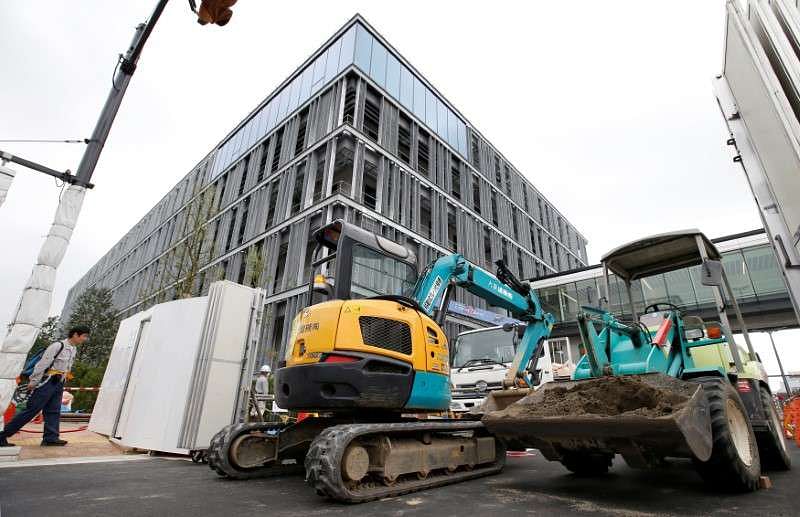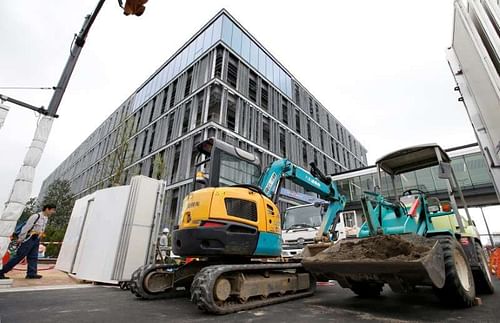
Tokyo Olympics plan hits roadblock over fish market's relocation

By Elaine Lies
TOKYO (Reuters) - Tokyo won the 2020 Olympics on its reputation for efficiency, but a string of blunders has now been compounded by the city's new governor halting relocation of the world's largest fish market, jeopardizing a road needed for the Summer Games.
Unless the road linking the Olympic village to the yet-to-be-built National Stadium is constructed in time, Tokyo could run the risk of athletes and spectators alike being stuck in traffic around the key venues.
Last month, Governor Yuriko Koike ordered a delay in moving Tsukiji market, a popular tourist destination, because of concerns about the cleanup of toxic pollution, including unsafe levels of cancer-causing benzene, at its proposed new home.
"This place is old, and everyone would like something new," 66-year-old tuna wholesaler Shonosuke Ishii told Reuters. "But given the benzene and other things, that site isn't good for a place handling food. People worried about contamination won't buy fish."
The controversy over the plan is at least the third major embarrassment faced by the 2020 organizers.
"This could be a great chance for Japan to show off its skills and technology, but all this talk of problems is pathetic," said Hitoshi Sakai, who heads a private Tokyo think tank and worked on Tokyo's failed 2016 Olympics bid.
Tokyo was forced to scrap the first stadium design because it was too expensive. And they had to redesign the games logo after being hit by accusations of plagiarism.
Two of the city's governors also have resigned over money scandals since Tokyo won rights in 2013 to host the 2020 Olympics, promoting itself as a "safe pair of hands".
Kenichiro Hisano, an official in Tokyo Metropolitan Government's construction division, said a delay in Tsukiji's move by six months would make it impossible to meet the tight construction schedule for the new road.
Tokyo's candidature file for the games, published in 2013, says that in 2012, travel time between the Olympic Village and stadium was an estimated 25 minutes but that in 2020, based on the assumption the road is completed, it would be 10 minutes.
"We think it may be difficult to finish by the Olympics," Hisano said.
BENZENE, ARSENIC AND MERCURY
Set on prime real estate on Tokyo Bay not far from the posh Ginza shopping district, the 80-year-old Tsukiji market is warren of stalls where eels flap in styrofoam boxes and mechanised bandsaws slice frozen tuna.
Fifteen years ago, the Tokyo government decided to move the market two kilometres (just over a mile) to a manmade island called Toyosu, where a gas plant once stood.
"The original rationale was the existing market was obsolete - crowded, messy, took up valuable real estate," said Theodore Bestor, a Harvard professor and author of a book about Tsukiji.
But the new site has been plagued with problems. Soil tested in 2008 was found to contain benzene at 43,000 times safe levels, as well as arsenic and mercury.
The city has removed the top 2 metres of soil and replaced it with fresh dirt. And at the advice of environmental experts, it said it would pack 2.5 more metres of clean soil on top of that before building any structures.
But, soon after Koike was elected in July she announced that protective measures hadn't been carried out as planned and halted the move.
Koike said this month that the extra soil had never been put under several key buildings, including those that would be used to sell fish and produce. Instead, ankle-deep water is pooling in basements, which are otherwise filled with utility pipes.
"A market ignoring safety is inconceivable," Koike told a news conference last month. "The buildings, the water, the food - we need to investigate their safety one by one, and make an overall decision."
Whether the move goes ahead depends on the findings of a panel of experts reviewing the plans and the results of air and water tests, a Tokyo government official said.
On Thursday, a Tokyo government survey found benzene at 1.4 times safe levels in water under a building set to sell produce, media reports said. Officials were not immediately available for comment.
Olympic organizers have asked that Koike inform them early if the delay will have an impact on preparations.
Meantime, fish-sellers, many of whom already had reservations about the Toyosu location, are left in limbo.
"We want the government surveys as soon as possible," said Makoto Nakazawa, head of the Central Market Labour Union and a 30-year Tsukiji veteran. "The whole situation is irresponsible."
(Reporting by Elaine Lies; Editing by Simon Cameron-Moore)